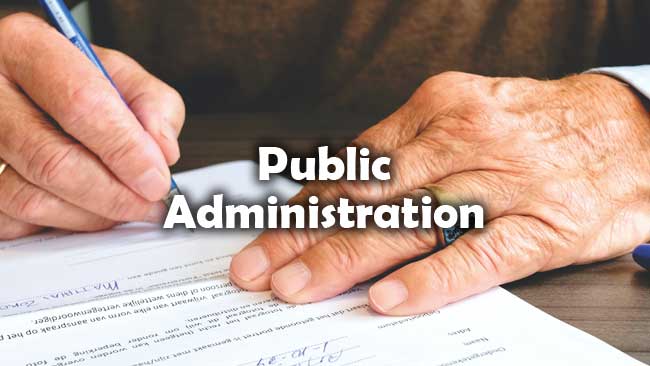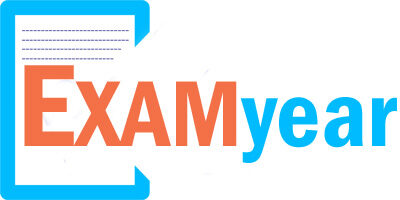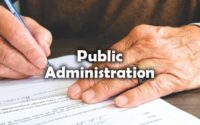IGNOU MPA Public Administration Question Papers
IGNOU MPA Public Administration Question Papers are available here to download for free. The candidates who are preparing for IGNOU MPA Exam and in search for preparation tips & pattern to prepare for the written exam.

Applicants can get IGNOU MPA Previous Year Question Papers & IGNOU Public Administration Exam Pattern, IGNOU Public Administration Syllabus from our website.
You can also download the IGNOU MPA Exam Sample Questions with answers for free. We have provided the IGNOU Public Administration Solved Papers to give proper guidance for the aspirants who are preparing for IGNOU Public Administration written exam.
Public Administration Question Papers for IGNOU MPA
1. It is known as a blank cheque given to the executive by the Lok Sabha :
(A) Vote on Account
(B) Additional Grant
(C) Vote on Credit
(D) Exceptional Grant
2. A policy-cut motion ends up in :
(A) Cut in plan expenditure
(B) Suggesting an alternative policy
(C) Change in government policy
(D) Rejection of a programme
3. Annual Grants-in-aid to the states has been provided under Article :
(A) 264
(B) 271
(C) 275
(D) 280
4. It is a multistage destination based tax :
(A) Income Tax
(B) Property Tax
(C) Sales Tax
(D) Goods and Services Tax
5. The key agency to initially translate the constitutional provisions of a social welfare state into practice has been :
(A) Central Social Welfare Board
(B) Ministry of Social Justice and Empowerment
(C) National Commission for SC/ST
(D) Planning Commission
6. Durga Bai Deshmukh award for women development is given to :
(A) A woman social worker
(B) Voluntary organization
(C) Department of women and child development
(D) Family counselling centre
7. Who stated that social welfare measures were essential but their implementation should be undertaken co-operatively rather than as a function of state ?
(A) Fried Lanter
(B) Wayne Vasey
(C) Robert Owen
(D) Jawaharlal Nehru
8. The concept of ‘cultural lag’’ was put forth by :
(A) Wilfredo Pareto
(B) K. Davis
(C) Ginsberg
(D) William Ogburn
9. Which one of the following is not correctly matched ?
(A) B.P. Mandal Commission – 1978
(B) National Commission for Backward Classes – 1993
(C) Backward Classes Commission – 1953
(D) National Commission for Socially and Educationally Backward Classes – 2015
10. Which of the following Articles of the Constitution of India makes provision for educational advancement of the Scheduled Tribes by Reserving Seats in educational institutions and granting scholarships ?
(A) Article 15(4)
(B) Article 16(4)
(C) Article 330 and 332
(D) Article 339(1)
11. Assertion (A) and Reason (R) Pattern :
Assertion (A) : Economic Planning can partially solve the problem of social justice.
Reason (R) : Economy is the wheel of society.
Codes :
(A) Both (A) and (R) are true and (R) is the correct explanation of (A)
(B) Both (A) and (R) are true but (R) is not the correct explanation of (A)
(C) (A) is true but (R) is false
(D) (A) is false but (R) is true
12. Which of the following do not provide social welfare services throughout the whole world ?
(A) World Health Organisation (WHO)
(B) Red Cross
(C) United Nations Children’s Fund
(D) U.N. Security Council
13. The National Commission for Minorities celebrates ‘Minorities Rights Day’ on ………………….
(A) 24th April
(B) 25th December
(C) 8th March
(D) 18th December
14. Who defines public policy as ‘Authoritative allocation of values for the whole society’’ ?
(A) Peter Self
(B) Thomas Dye
(C) Y. Dror
(D) David Easton
15. Who said, ‘Policy Analysis is both Art and Craft’ ?
(A) William Dunn
(B) Aaron Wildvasky
(C) Charles Lindbloom
(D) E.S. Quade
16. Which three ‘policy evaluation’ criteria were suggested by Thomas Smith ?
(A) Policy design, Policy process and Policy achievement
(B) Policy making, Policy approved and Policy implementation
(C) Policy achievement, Policy process and Policy evaluation
(D) Policy process, Policy plan and Policy approval
17. Which one is not a hall-mark of postpositivists approach to policy studies ?
(A) Subjective Reflection
(B) Normative Analysis
(C) Quantitative Analysis
(D) Argumentation
18. According to whom ‘Lindbloom’s Incrementalist model’ of decision making was quite conservative and unsatisfactory ?
(A) Harold Lasswell
(B) Y. Dror
(C) David Easton
(D) Thomas Dye
19. Policy streams perspective of agenda setting is advocated by :
(A) Roger Cobb
(B) Charles Elder
(C) John Kingdon
(D) James Anderson
20. The Implementation game is a seminal work of :
(A) Jeffrey L. Pressman
(B) Daniel A. Mazmanion
(C) Peter Hupe
(D) Eugene Bardach
| GK | Old Question |
| MCQ | Previous Question |
| Quiz | UGC NET |
| Sample Question | IGNOU MPA |
| Model Papers | UPSC |
21. The official policy makers are ………
(1) Legislatures
(2) Executives
(3) Administrators
(4) Civil society
Select the correct answer from the codes given below :
Codes :
(A) (3) and (4)
(B) (1), (2) and (3)
(C) (2), (3) and (4)
(D) (1) and (4)
22. Assertion (A) and Reason (R) pattern :
Assertion (A) : Participatory approach to policy making leads to adoption of better informed policies.
Reason (R) : Participatory approach takes into consideration the views of different stakeholders.
Answer the question using the codes given below :
Codes :
(A) Both (A) and (R) are true
(B) Both (A) and (R) are true and (R) is the explanation of (A)
(C) Only (A) is true, (R) is False
(D) Both (A) and (R) are true, but (R) is not the explanation of (A)
23. Delegated legislation is an outcome of the positive role of :
(A) Citizens
(B) Executive
(C) Technology
(D) Values
24. World Bank for first time in 1989 highlighted the concept of good governance. Which of the following is not its dimensions ?
(A) Public Sector Management
(B) Accountability
(C) Legal Framework for development
(D) Democracy
25. The following is not a salient feature of new public management :
(A) Output oriented administration
(B) Process oriented administration
(C) Privatization
(D) Major emphasis on cost cutting
26. Digital Divide is :
(A) More effective linkages between Citizens and Government
(B) Improved efficiency of government workers
(C) Gap between groups having access to technology and without technology
(D) Partnership between public, private and civil society
27. Gender Related Development Index attempts to capture ……………..
(A) Human Poverty Index
(B) Adult Illiteracy Rate
(C) Gender Disparities
(D) Human Development Index
28. 12th Annual Convention of the Central Information Commission was organized on :
(A) 6th December, 2017
(B) 6th December, 2016
(C) 6th December, 2015
(D) 6th December, 2018
29. The concept ‘Droit Administratif’ is related with :
(A) Good Governance
(B) Administrative Law
(C) New Public Service
(D) New Public Management
30. Who termed third world countries as soft states ?
(A) U.L. Goswami
(B) Weidner
(C) Gunnar Myrdal
(D) Donald Stone
31. The origins of the Right to Information Movement lie in :
(A) Devdungri, Rajasthan
(B) Jhunjhunu, Rajasthan
(C) Bikaner, Rajasthan
(D) Jaipur, Rajasthan
32. According to whom ‘‘ to decide upon the right problem of research is half way to success’’ ?
(A) George Holmes
(B) R. L. Eckoff
(C) Lundberg
(D) Goode and Hatte
33. Which of the following is not an advantage of using closed questions in a survey ?
(A) It reduces the risk of variability in the way answers are recorded
(B) It makes answers easier to process and analyse
(C) They present respondents from giving spontaneous unexpected answers
(D) Closed questions are quicker and easier for respondents to complete
34. The term ‘secondary analysis’ refers to the techniques of :
(A) conducting study of seconds and other measures of time
(B) Analysing your own data in two different ways
(C) Analysing existing data that has been collected by another person or organisation
(D) Working part time on project along side other responsibilities
35. This method entails in-depth study of any one unit of social life :
(A) Field study
(B) Case study
(C) Experimental method
(D) Survey method
36. Which one of the following is not a fundamental principle of scientific research ?
(A) Empiricism
(B) Moral Neutrality
(C) Objectivity
(D) Definiteness
37. ‘‘A questionnaire is a list of questions given to a decided number of respondents for them to answer’’. Who stated ?
(A) P.V. Young
(B) Bogardus
(C) Johan Galtung
(D) M.L. Bowell
38. The outcome of an interview may be faulty due to its :
(A) Flexibility
(B) Easy administration
(C) Subjective interpretation
(D) Less anonymity
39. Development of Public Administration is characterised according to ‘locus’ or ‘focus’, in which locus is the institutional :
(A) ‘what’ of the field
(B) ‘when’ of the field
(C) ‘where’ of the field
(D) ‘how’ of the field
40. According to Josiah Stamp, Public Administration is not characterised by :
(A) Uniformity of rules
(B) Political accountability
(C) Coordination
(D) Matrix structure
41. Decision-making comprises of three different activities :
(A) Intelligence, design, choice
(B) Intelligence, problem, choice
(C) Opinion, design, choice
(D) Intelligence, design, environment
42. Assertion (A) : Instrumentality role subsumes the subordination of the administrative system to the political control.
Reason (R) : In Parliamentary democracy executive is accountable to the legislature.
Answer the question using the below given codes :
Codes :
(A) Both (A) and (R) are true and (R) is the correct explanation of (A)
(B) Both (A) and (R) are true but (R) is not the correct explanation of (A)
(C) (A) is true but (R) is false
(D) (A) is false but (R) is true
43. According to Pfiffner the following is not the kind of staff :
(A) General
(B) Technical
(C) Auxiliary
(D) Line
44. For civil servants in India, code of conduct facilitates :
(A) Administrative skill
(B) Economic risement
(C) Political neutrality
(D) Greater freedom
45. T-group developed by National Training Labs, USA is cited as an example of :
(A) Role play and management games
(B) Sensitivity training
(C) Incidence training
(D) Syndicate method
46. Neutrality of civil servants lies in :
(A) Indifference to the government policies
(B) Keeping away from public
(C) Non-belief in party ideology
(D) Responding to the government of every complexion
47. The determinant of span of control is not :
(A) Functional uniformity
(B) Leader’s ability
(C) Informal relations
(D) Geographical location
48. Which of the following statements is incorrect regarding the classical theory ?
(A) Classical theory is the name given by Herbert Simon
(B) Classical theory believes in the existence at certain universal administrative principles
(C) Classical theory is also known as administrative management theory
(D) It gives adequate attention to formal and informal groups in the organization
49. Which one of the following is not prakriti (or vital organ) of the state according to Kautilya ?
(A) Svamin
(B) Kosh
(C) Senapati
(D) Amatya
50. Weberian model of bureaucracy is :
(A) Universal
(B) Adaptable
(C) Innovative
(D) Best in stable environment

